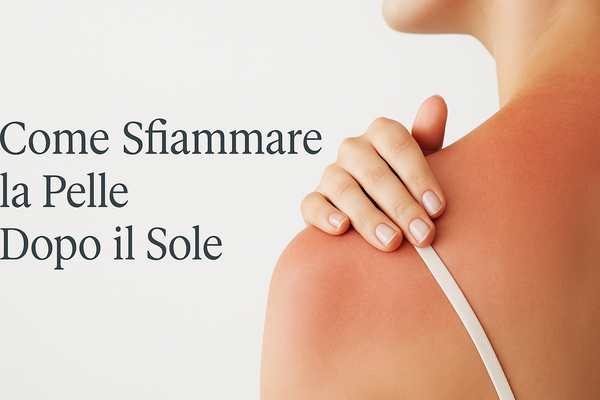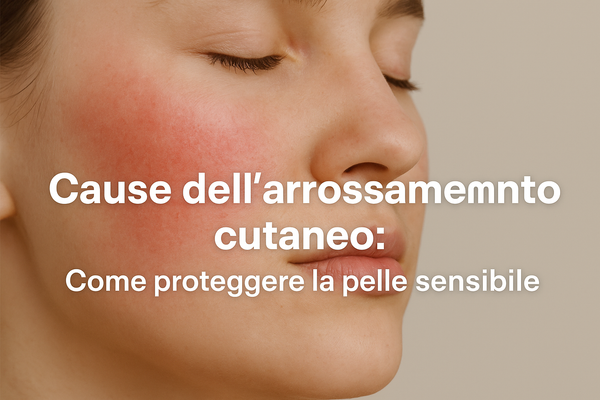Reddened Skin: Main Causes and Immediate Remedies Recommended by Experts

When the skin reddens easily, it is a sign that the skin barrier is compromised. Discover all the causes – internal and external – and clinically tested remedies to soothe it safely and quickly.
Skin redness is a common phenomenon affecting people of all ages and skin types. It is often experienced as an aesthetic discomfort, but it can actually hide deeper causes that need to be understood in order to intervene effectively and prevent worsening. The skin, as our first protective shield against the external environment, requires careful care, especially in the presence of irritations and redness. But what are the main causes and, above all, how can we intervene to effectively protect our skin?
The main causes of skin redness
1. Environmental factors
Intense cold, wind, UV radiation, and excessive sun exposure are among the primary causes of redness. Extreme weather conditions compromise the skin's lipid barrier, making it more vulnerable to external agents. Dermatological studies (Source: Dermatology Research and Practice, 2018) confirm that continuous exposure to cold and UV accelerates the degradation of ceramides, essential for the skin barrier.
2. Sensitive and reactive skin
Those with sensitive skin, often due to genetic reasons or internal imbalances (such as immune dysfunctions or alterations of the skin barrier), are more prone to redness, tingling, and burning sensations. According to the National Rosacea Society, about 50% of the fair-skinned population exhibits some form of skin sensitivity.
Learn more about what sensitive skin is and how to treat it properly.
3. Pollution and oxidative stress
Pollutant particles settle on the skin, causing a chronic inflammatory state that manifests with persistent redness, loss of radiance, and accelerated aging. Clinical studies (Journal of Investigative Dermatology, 2016) highlight how urban pollution increases the risk of chronic skin inflammation by 20%.
To learn more about the role of inflammation on the skin, read our article on types, causes, and treatments of skin inflammation.
4. Hormonal changes
Physiological events such as puberty, pregnancy, and menopause cause significant changes in hormone levels that can alter the skin's balance, making it more reactive and prone to redness and irritation.
5. Use of unsuitable cosmetics
The use of aggressive products containing alcohol or sensitizing substances can compromise the skin barrier, further irritating skin already prone to reactivity.
6. Dermatological conditions
Conditions such as rosacea, atopic dermatitis, couperose, or eczema are often responsible for widespread and chronic redness, which require targeted cosmetic and dermatological management. Rosacea, for example, affects about 10% of the world population (Source: American Academy of Dermatology).
7. Diet and lifestyle
A diet rich in inflammatory foods, such as refined sugars and saturated fats, can worsen the condition of sensitive skin. Similarly, alcohol consumption and cigarette smoking are known to increase systemic inflammation levels, aggravating redness and skin irritations.
8. Emotional stress
Psychological stress has a direct impact on the skin through the hypothalamic-pituitary-adrenal axis, increasing cortisol production. This hormone, if in excess, reduces the skin's ability to retain moisture and makes it more vulnerable to inflammation and redness.
How to protect and soothe reddened skin
1. Choose a gentle and protective skincare routine
Using products specifically formulated for sensitive skin helps strengthen the skin barrier and reduce reactivity. Gentle cleansers, soothing creams, and serums based on natural active ingredients are essential.
2. Deep hydration and repair
Key ingredients to look for:
-
Thermal Spring Water from the Piedmont Mountains: rich in minerals like magnesium and calcium, it helps restore skin balance.
-
Bisabolol: reduces inflammation and redness thanks to its natural anti-inflammatory properties.
-
Aloe Vera: hydrates, soothes, and promotes tissue regeneration.
-
Mallow, Calendula, and Althaea Complex: natural antioxidants and soothing agents suitable even for the most reactive skin.
Do you want to know why the Thermal Spring Water spray is so good for the skin? Discover all the benefits in our in-depth article.
3. Protection from weather elements
During colder or windy periods, it is important to create a protective barrier on the skin using specific creams. Using light scarves or thermal masks can reduce the direct impact of cold and wind.
4. Limit sun exposure
Always use adequate sun protection, even in winter. According to the World Health Organization, over 80% of skin aging signs are attributable to UV exposure.
5. Reduce oxidative stress
A diet rich in fruits, vegetables, and Omega-3 helps fight inflammation from within. Activities like yoga and meditation have been shown (Harvard Health Publishing) to lower cortisol levels, reducing systemic inflammation.
6. Monitor the skin and adopt preventive treatments
Regularly checking the condition of the skin helps to intervene promptly in case of worsening. Preventive treatments based on soothing ingredients can prevent the onset of severe or persistent redness.
The ideal solution: Nutralight Sensitive
For those who suffer from redness and skin sensitivity, Nutralight Sensitive represents an excellent solution. Formulated with natural and dermatologically tested ingredients, this cream stands out for its effectiveness in:
-
Soothe and protect: thanks to the combined action of Thermal Water, Mallow, Calendula, and Althaea.
-
Regenerate: the presence of Panthenol (Vitamin B5) and Vitamin B3 promotes cell renewal and strengthens the skin barrier.
-
Rebalance the skin: Niacinamide helps normalize sebum production, making the cream ideal also for combination, oily, and blemish-prone skin.
-
Hydrate without weighing down: the light and fresh texture is perfect for daily use, also as a post-shave or after-sun cream.

The philosophy of thermal skincare
Inspired by the wellness rituals of thermal baths, Nutralight Sensitive offers a unique hydration and regeneration experience, drawing strength from the purity of the Maritime Alps springs. Studies on crenocosmetics show that treatments based on thermal water significantly improve the skin's ability to retain hydration (Source: International Journal of Cosmetic Science, 2017).
Conclusion
Try Nutralight Sensitive, designed for skin prone to redness and sensitivity discomfort.
🌿 Nickel tested – Dermatologically tested – With Thermal Water from the Piedmont Alps. If you want healthy, balanced skin free from redness, it is essential to address the root of the problem by choosing targeted products formulated to respect skin sensitivity. With Nutralight Sensitive, you rediscover thermal wellness on your skin every day, protected and naturally radiant.









